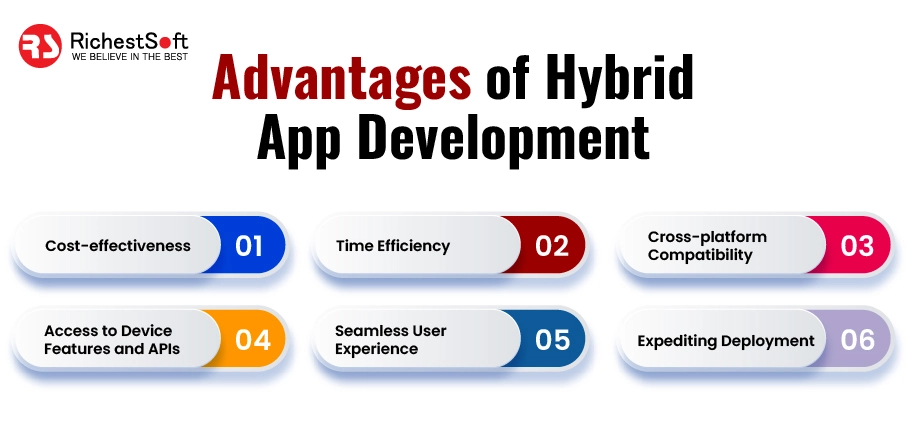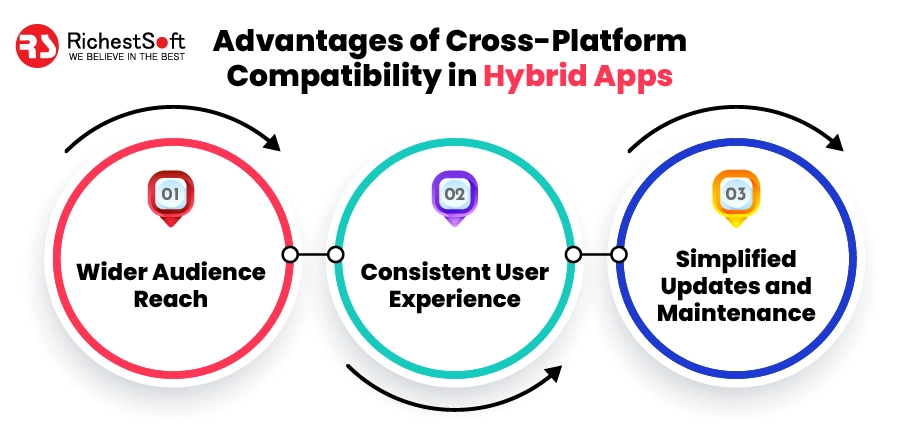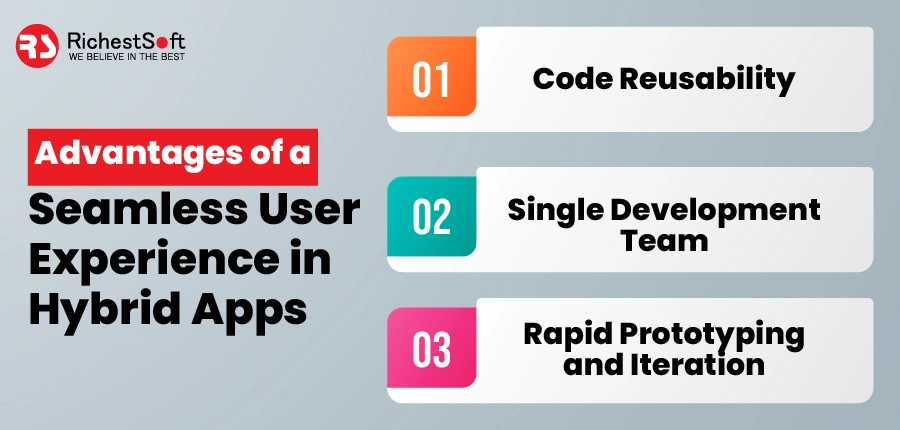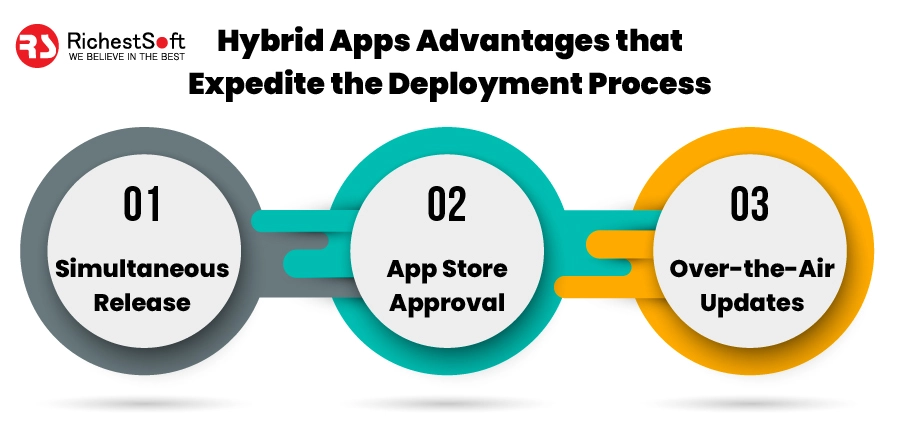Mobile phones have seamlessly integrated into our everyday routines in the rapidly evolving digital landscape. With an extensive array of mobile apps available across diverse platforms, business owners and developers often search for expert guidance to navigate the complex process of planning, designing, building, deploying, and maintaining their mobile applications. One alternative that has gained considerable popularity in hybrid app development.
Hybrid apps integrate the best of both worlds: the universality of web technologies with the performance and capabilities of native apps. They provide a practical solution for businesses seeking to reach a large audience across several platforms while maintaining user experience and development effectiveness. In this blog, we will examine the advantages of hybrid apps and discuss why they appeal to amateur and experienced developers.
Statistics and Market Trends
Firstly, let us take a moment to analyze the current market trends and the growing popularity of hybrid apps. A report by Statista predicts that global mobile app revenues will reach an astounding $935 billion by 2023. This remarkable growth indicates the escalating need for mobile applications in various industries. Now, let’s discuss the advantages.
When it comes to Mobile app development, hybrid apps have gained significant traction. As per a survey conducted by Developer Economics, around 42% of mobile developers choose hybrid app development frameworks. The popularity of frameworks such as Java, React Native, Flutter, and Ionic further solidifies hybrid apps’ market presence and acceptance.
In this blog, we will explore the advantages of hybrid apps, providing beginners and aspiring developers with a comprehensive understanding of this approach.
Importance of Remaining Competitive in the Digital World
In a fiercely competitive digital landscape, businesses must stay ahead of the curve to survive and thrive. Embracing hybrid app development provides a strategic advantage by allowing companies to:
What are Hybrid Apps?

A hybrid application is a software app that combines native and web application elements. It essentially wraps a web app within a native app shell. When users download and install the app, the shell utilizes the device’s capabilities through an embedded browser: this browser and its plugins run in the background, hidden from the user.
Developers favor hybrid apps as they enable writing code once and deploy it on multiple platforms. However, due to the additional layer between the source code and the target platform, hybrid apps may have slightly slower performance compared to native or web versions of the same app.
How Do Hybrid Apps Work?
Hybrid apps leverage web technologies to create a user interface and business logic equivalent to how a web app functions. However, instead of running in a web browser, hybrid apps are covered in a native shell or container that allows them to access native device capabilities.
This shell links web technologies and the device’s native APIs, enabling the hybrid app to integrate web content into a native app framework smoothly. It authorizes the app to access the device’s hardware and software components.
Advantages of Hybrid App Development

👉Cost-effectiveness and time efficiency
Developing and maintaining mobile apps can be a significant investment for businesses. Hybrid apps offer distinct cost advantages that make them an appealing choice:
(a) Shared Codebase: Hybrid apps offer a significant advantage in allowing for the use of a shared codebase. It means a single codebase can create an app across multiple platforms, including iOS and Android. By avoiding making separate apps for each platform, businesses can save considerable time and resources, ultimately resulting in cost savings.
(b) Reduced Development Effort: Developers can leverage their web development talents and frameworks with hybrid apps. It stops the necessity to learn platform-specific app programming languages and the development cycle. Businesses can benefit from web technologies such as HTML, CSS, and JavaScript. These technologies can allow them to access a vaster pool of app developers, decrease hiring costs, and accelerate development.
(c) Streamlined Updates and Maintenance: Maintaining and updating apps can be time-consuming and expensive. Hybrid apps streamline this technique by authorizing updates to be used universally to the shared codebase. Changes and improvements can be made once and propagated to all platforms simultaneously. This streamlined process provides consistent user experiences and saves time and effort in the long run.
👉Time Efficiency of Hybrid Apps:
In today’s digital landscape, speed is of the essence. Hybrid apps offer several advantages contributing to time efficiency:
(a) Faster Development Cycles: With hybrid apps, developers can write code once and deploy it across multiple platforms. It significantly reduces the development time compared to building separate native apps. Businesses can get their mobile apps to market quickly, achieving a competitive advantage and maximizing their reach.
(b) Simultaneous Deployment: Unlike native apps, which need separate development and release processes for each platform, hybrid apps can be deployed simultaneously across multiple platforms. It eliminates the requirement for platform-specific adjustments and saves valuable time. Businesses can quickly achieve their target audience, improve their market presence, and generate user engagement.
(c) Consistent User Experience: Hybrid apps leverage native capabilities, providing a consistent and seamless user experience across different platforms. It eliminates the need for separate design and development efforts for each programme, saving time and providing a unified brand experience for users.
👉Cross-platform compatibility
Cross-platform compatibility refers to an app’s capacity to function without interruption on several platforms and gadgets, including iOS and Android.
Hybrid apps are designed to operate across different platforms, stopping the necessity of developing well-defined native apps for each operating system. They achieve this by employing a single codebase and web technologies such as HTML5, CSS3, and JavaScript.
Advantages of Cross-Platform Compatibility in Hybrid Apps:

(a)Wider Audience Reach: With the growing diversity of mobile devices and operating systems, businesses must reach a wide range of users. Hybrid apps excel in this area by enabling firms to target iOS and Android users and users accessing the app via web browsers. Companies can grow their market reach and improve user engagement by catering to a broad audience.
(b) Consistent User Experience: Cross-platform compatibility provides a consistent user experience across different devices and operating systems. Hybrid apps leverage web technologies to deliver a suitable interface and functionalities, regardless of the platform on which they are accessed. This consistency improves user satisfaction, makes trust, and allows companies to establish a powerful brand image.
(c) Simplified Updates and Maintenance: Maintaining mobile apps up-to-date and maintaining them across many platforms can be a complex and time-consuming task. However, with hybrid apps, updates, and maintenance become simpler. Changes made to the shared codebase can be deployed universally, ensuring that updates reach all platforms simultaneously. This streamlined process saves time and effort, enabling businesses to focus on providing an exceptional user experience.
👉Access to device features and APIs
Hybrid apps provide businesses with a gateway to harness the full potential of device features, allowing them to deliver robust and feature-rich applications. Here are some advantages of accessing device features and APIs in hybrid apps:
(a) Camera and Media Capabilities: Hybrid apps can tap into the device’s camera and media capabilities. It facilitates companies to build apps that leverage camera functionalities, such as capturing photos and videos and accessing media files. This benefit extends business possibilities in different sectors, such as e-commerce, social media, and augmented reality.
(b) Geolocation and Mapping: Hybrid apps can leverage the device’s geolocation capabilities, allowing businesses to deliver location-based services. Whether locating nearby restaurants, tracking deliveries, or offering personalized recommendations based on the user’s location, accessing geolocation features enhances the user experience and adds value to the app.
(c)Push Notifications: Hybrid apps can send push notifications, allowing businesses to engage users with timely and relevant information. Whether it is notifying users about new content, promotions, or important updates, push notifications help companies to stay connected with their audience and drive user engagement.
(d) Device Sensors: Hybrid apps can access accelerometers, gyroscopes, and compasses. It opens possibilities for creating innovative and interactive experiences, such as motion-based gaming, fitness tracking, and augmented reality applications. Accessing device sensors enhances user engagement and provides unique features that separate hybrid apps.
👉Seamless user experience
A seamless user experience refers to the ability of an app to provide a consistent look, feel, and functionality across different devices and platforms. Hybrid apps accomplish this by leveraging web technologies and integrating with native capabilities. The goal is to create an app that feels native, regardless of the underlying technology used.
Advantages of a Seamless User Experience in Hybrid Apps:

Faster development and deployment
Hybrid apps provide businesses with a streamlined approach to app development, allowing for faster turnaround times and quicker go-to-market strategies. Here are the advantages of more rapid app development in hybrid apps:
(a) Code Reusability: Hybrid apps have the most significant feature: reuse codebase across different platforms. An app developer can write and run a single code across platforms like iOS and Android using web technologies such as HTML, CSS, and JavaScript. This code reusability stops the necessity to develop separate apps from scratch, resulting in considerable time savings.
Hybrid apps have the most significant feature: reuse codebase across different platforms.
(b)Single Development Team: Unlike native app development, which requires separate teams for each platform, hybrid apps can be developed by a single team with expertise in web technologies. This consolidation of resources streamlines the development process, minimizes coordination efforts, and reduces potential bottlenecks. Businesses can save time and effort by having a unified team working on app development.
(c) Rapid Prototyping and Iteration: Hybrid app development frameworks offer features and tools that facilitate rapid prototyping and iteration. These frameworks provide pre-built UI components, plugins, and libraries that accelerate development. It allows developers to create prototypes quickly, gather feedback, and iterate on the app’s features and design, ensuring faster progress and efficient development cycles.
Expediting Deployment with Hybrid Apps:
The speed of deploying an app to the market is crucial for businesses to stay competitive. Hybrid apps offer several advantages that expedite the deployment process:

(a) Simultaneous Release: Hybrid apps enable businesses to deploy their applications simultaneously across multiple platforms. Unlike native apps, which require separate development and release cycles for each platform, hybrid apps can be built once and released across various platforms simultaneously. It eliminates the need for platform-specific adjustments and saves valuable time, allowing businesses to reach their target audience faster.
(b) App Store Approval: Hybrid apps generally go through a more straightforward and faster approval process in app stores than native apps. Since hybrid apps are assembled using web technologies and frameworks, they adhere to standard guidelines and are less likely to encounter platform-specific complications during the review process. This expedited approval process reduces the time between development completion and app availability to users.
(c) Over-the-Air Updates: Hybrid apps can leverage over-the-air (OTA) updates, authorizing businesses to push updates immediately to users’ devices without requiring them to manually update the mobile app through an app store. It ensures that feature enhancements, bug fixes, and security updates can be provided fast, enhancing the user experience and guaranteeing the app stays up to date.
FAQs
Q1: What is a hybrid app?
Ans: A hybrid app is like a web app but with a light native app “container, ” allowing it to utilize specific native platform features and device hardware. It includes functionalities – accessing the camera, calendar, push notifications, and pinch/spread gestures unavailable to web applications. Like web applications, hybrid apps are developed utilizing widely used front-end technologies and languages like JavaScript, HTML5, and CSS, authorizing them to work across multiple platforms.
Q2: What are the advantages of hybrid apps?
Ans: Hybrid apps offer several benefits, including:
- Cross-platform compatibility: Hybrid apps can operate on multiple platforms, getting a broader audience and lowering app development costs using a shared codebase.
- Access to device features and APIs: Hybrid apps can leverage native device features like geolocation, camera, and push notifications, delivering a rich and immersive user experience.
- Seamless user experience: Hybrid apps provide a consistent look, feel, and functionality across different platforms, assuring a unified user experience.
- Faster development and deployment: Hybrid apps can be developed and launched faster than native apps by reusing code and utilizing a single app development team.
- Cost-effectiveness: Hybrid apps deliver a cost-effective solution by decreasing the requirement to build separate apps for each platform and facilitating the app development cycle.
Q3: Are hybrid apps as performant as native apps?
Ans: While hybrid apps may not match the performance of fully native apps in specific scenarios, advancements in hybrid app development frameworks have significantly improved their performance. Hybrid apps can leverage native device capabilities through plugins and APIs to achieve near-native performance for most use cases.
Q4: Do hybrid apps require an internet connection to function?
Ans: Hybrid apps can work both online and offline. They can store data locally and utilize offline functionality, allowing users to access content and perform tasks without an internet connection. However, particular features like real-time data updates or web-based services may require internet connectivity.
Q5: Can hybrid apps be published on app stores?
Ans: Yes, hybrid apps can be published on popular apps like Apple App Store and Google Play Store. They undergo a similar submission and review process as native apps. Hybrid apps that adhere to platform guidelines and provide a quality user experience can be successfully published.
Conclusion
Hybrid apps bring many advantages, making them a practical choice for businesses entering the mobile app market. Their cross-platform compatibility allows for wider user reach, while access to device features and APIs ensures a rich and immersive user experience. The seamless user experience across different platforms enhances brand consistency and user satisfaction.
Moreover, the faster development and deployment process of hybrid apps saves valuable time and resources. Cost-effectiveness is an additional benefit, as hybrid apps eliminate the need for separate app development for each platform.
By considering the advantages of hybrid apps, businesses can make informed decisions to meet their mobile app goals effectively. Whether it’s increasing market share, optimizing app development processes, or delivering a consistent user experience, hybrid apps offer a comprehensive solution. Embrace the advantages of hybrid app development to stay competitive and drive success in the dynamic digital landscape.
 +1 315 210 4488
+1 315 210 4488 +91 798 618 8377
+91 798 618 8377


